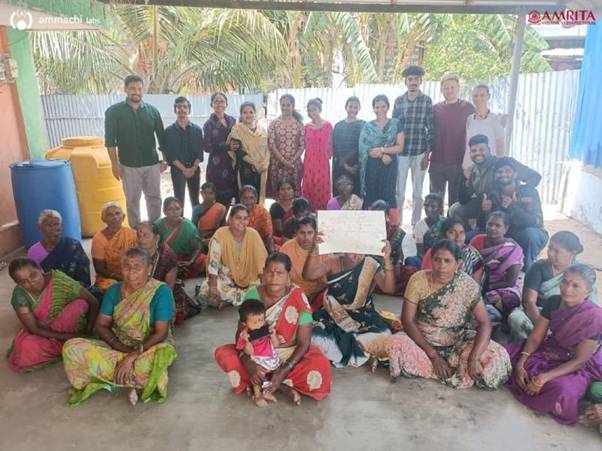Amrita Vishwa Vidyapeetham actively supports clean energy and energy-efficient technology policy development by informing and engaging governments, multilateral platforms, and civil society networks at the global, national, regional, and local levels. Leveraging its academic expertise, international leadership roles, and evidence-based research, the university contributes to the design, refinement, and continuity of public policy frameworks that advance clean energy transitions, low-carbon development, and climate-resilient governance. During 2024, Amrita maintained and advanced its ongoing engagement through structured participation in global policy processes, advisory roles, and multi-stakeholder consultations, reinforcing sustained policy impact beyond the campus.
Amrita Vishwa Vidyapeetham plays an active role in shaping global policy dialogue on clean energy, climate action, and energy-efficient technologies through its leadership in international multi-stakeholder platforms. In 2024, as Civil 20 (C20) Brazil commenced its activities under Brazil’s G20 Presidency, the work undertaken during C20 India 2023, led by Amrita, formed a critical foundation for global policy continuity and advancement.
The C20 Brazil Inception Meeting, held in Recife, Pernambuco (March 26–28, 2024), brought together over 2,000 civil society entities from more than 60 countries, representing more than 1,200 CSOs across 150+ countries. Dr. Krishnashree Achuthan, Dean of Postgraduate Studies at Amrita Vishwa Vidyapeetham, represented C20 India on the International Advisory Council, supporting global deliberations on climate action, resilient communities, and clean energy transitions. During the meeting, strategic discussions were held with C20 Brazil leadership to ensure sustained collaboration and alignment of priorities through 2024. Additional Amrita faculty contributed to global deliberations through online participation, strengthening interdisciplinary engagement.
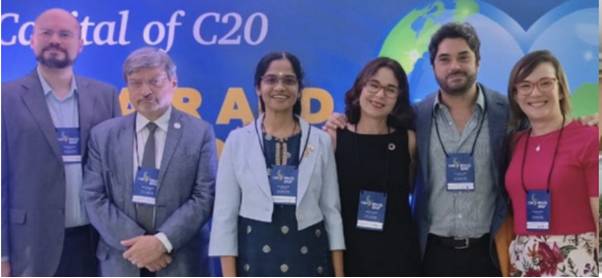
Amrita’s leadership in developing the C20 India 2023 Policy Pack directly informed and strengthened C20 Brazil’s 2024 agenda, including its policy recommendations to the G20. The policy pack—developed through extensive global consultations, conferences, workshops, youth engagement programmes, and community dialogues—provided evidence-based frameworks, methodologies, and policy recommendations on clean energy, climate justice, and sustainable development.
By enabling continuity across G20 Presidencies, Amrita supported global policy coherence and accelerated the evolution of clean energy and energy-efficiency policy recommendations at the international level. These contributions helped inform global discussions on low-carbon development pathways, inclusive energy transitions, and climate-resilient governance, reinforcing Amrita’s role as a trusted academic and civil society partner in global clean-energy policy development.
Engagements With NGOs
CSO’s
Countries
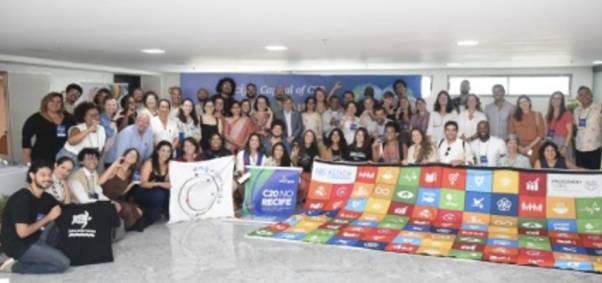
Amrita recommended that G20 nations commit to:
C20 urged G20 nations to:
Amrita advocated that G20 nations:
Link: https://www.amrita.edu/unsdg/sdg7/policy-development-for-clean-energy-tech/ (Published: December 22, 2024)
Lorem ipsum dolor sit amet, consectetur adipiscing elit. Ut elit tellus, luctus nec ullamcorper mattis, pulvinar dapibus leo.
Lorem ipsum dolor sit amet, consectetur adipiscing elit. Ut elit tellus, luctus nec ullamcorper mattis, pulvinar dapibus leo.
The working group consulted with international organizations from diverse regions:
| Region | Key Organizations |
| Asia-Pacific | WWF Australia, Greenpeace Japan, CarbonCare InnoLab (China), CeroED LTD (Singapore), Indonesian organizations including HFI, PREDIK, PRAKARSA |
| Africa | Team Environment Kenya, Global Green Environmental Network (Ghana), Green Carbon Ghana, Climate Action Network-Uganda, African Smart Cities Innovation Foundation (Nigeria) |
| Americas | One Tree Planted (USA), Smart Energy Services LLC (USA), Landesa (USA), Gallinas Watershed Council (USA) |
| Europe | ActionAid International (Belgium), Green Cross International (Switzerland), Italian Climate Network (Luxembourg), University of Lincoln (UK) |
| Global | Climate Action Network (Worldwide), Syu Design (International) |
In 2024, Amrita Vishwa Vidyapeetham contributed to global policy dialogue supporting clean energy and sustainable technology development through the active participation of its UNESCO Chairs in the UNESCO–African Union international forum “Transforming Knowledge for Africa’s Future”, held in Addis Ababa, Ethiopia. Convened by UNESCO and the African Union Commission, the forum brought together representatives from all 55 African Union member states, senior officials from national education ministries, leading universities, and global UNESCO stakeholders.
Dr. Maneesha V Ramesh, UNESCO Chair on Experiential Learning for Sustainable Innovation and Development, participated in high-level sessions on research cooperation and capacity development in water, contributing academic and policy insights relevant to sustainable resource management, clean energy transitions, and climate-resilient technologies.
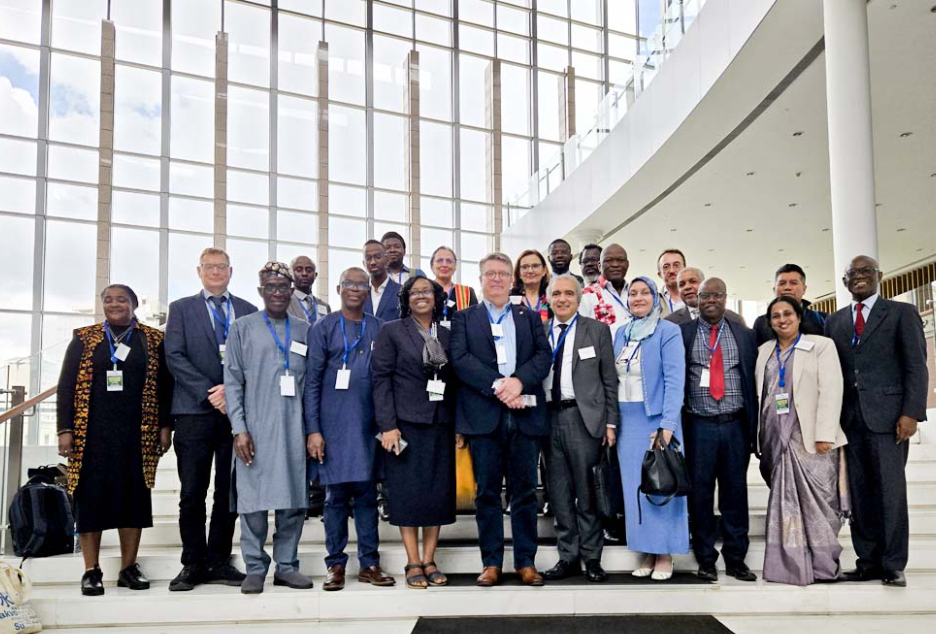
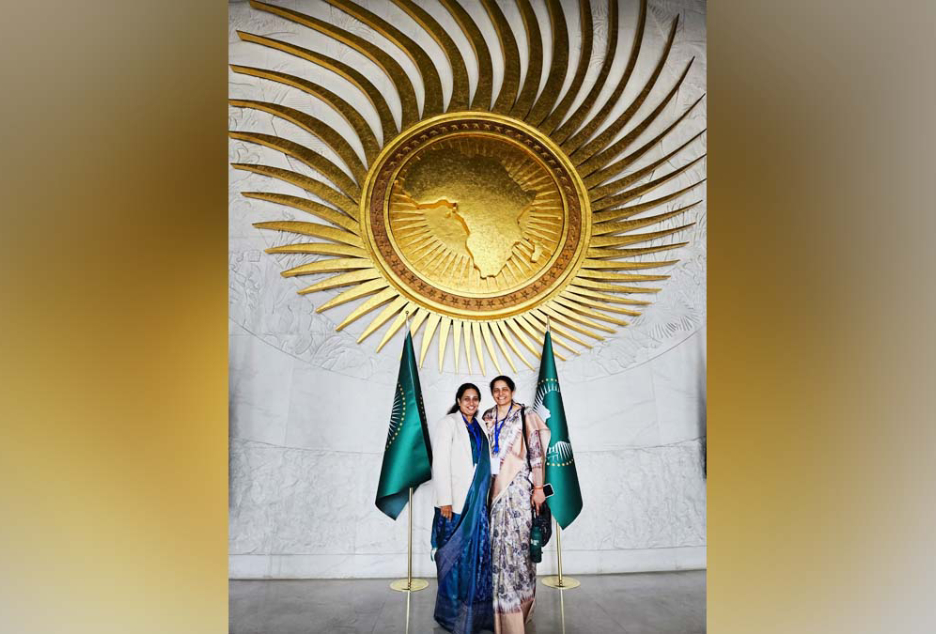
Amrita Vishwa Vidyapeetham actively collaborates with ministries and departments of the Government of India, as well as state governments, to inform and support national policy development related to clean energy, energy efficiency, and broader Sustainable Development Goals (SDGs). Through research-driven inputs, technology innovation, and capacity-building initiatives, the university contributes to the design and implementation of adaptive, evidence-based policies. These partnerships enable Amrita to promote sustainable development practices, advance clean-energy transitions, strengthen environmental governance, and support inclusive national efforts aligned with India’s SDG commitments.
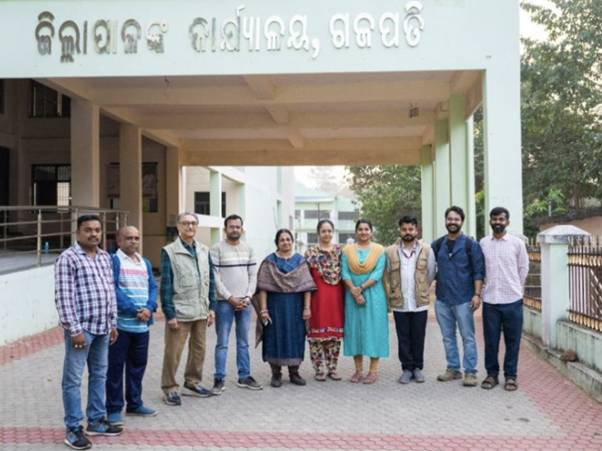
| Organization | Area of Collaboration | Relevant SDGs |
| Center for Research in Schemes and Policies (CRISP) | Identify policy implementation gaps and strengthen social data sciences. CRISP, founded by civil servants with over three decades of experience, works directly with central and state governments to help design, redesign, and implement better schemes and policies. | SDG 13, SDG 14, SDG 15 |
| Ministry | Collaborations | Relevant SDGs |
| Ministry of Environment, Forest and Climate Change | Policies for ecosystem restoration, biodiversity protection, and coastal conservation. Promoting circular economy and sustainable practices for emission reduction. Disaster management frameworks for climate resilience. | SDG 13, SDG 14, SDG 15 |
| Ministry of Jal Shakti | Policies for integrated water management and climate-resilient infrastructure. Ensuring access to clean water and sanitation. Capacity-building for water conservation at community levels. | SDG 6, SDG 12 |
| Ministry of Health and Family Welfare | Expanding access to affordable healthcare. National strategies for mental health and disease prevention. Promoting “One Health” addressing human, animal, and environmental health interlinkages. | SDG 3 |
| Ministry of Education | Inclusive, human-centered education with a focus on sustainability. Promoting skill development and indigenous knowledge systems. Developing digital literacy and online education platforms. | SDG 4, SDG 10 |
| Ministry of Women and Child Development | Policies for safety and empowerment of women and girls. Mental health support and gender-responsive programs. Inclusion of women in decision-making and economic empowerment. | SDG 5, SDG 8 |
| Ministry of Social Justice and Empowerment | Frameworks for social protection of marginalized groups, including LGBTQIA+ and indigenous communities. Accessibility initiatives for education and employment. Equal opportunities in the workplace. | SDG 10, SDG 16 |
| Ministry of Agriculture and Farmers Welfare | Promotion of agroecology and climate-resilient agricultural practices. Knowledge transfer for sustainable farming. Incentives to reduce food waste and resource-efficient production. | SDG 2, SDG 12 |
| Ministry of Electronics and Information Technology | Bridging the digital divide. Promoting accessible digital infrastructure. Cybersecurity frameworks and ethical AI guidelines. Public digital platforms for transparency and citizen participation. | SDG 9, SDG 16 |
| Ministry of Labour and Employment | Expanding vocational training for underserved populations. Promoting just and equitable workplace policies. | SDG 8, SDG 10 |
Amrita Vishwa Vidyapeetham contributed to national policy development on climate resilience and disaster risk reduction through its leadership in the International Conference on Tsunami Risk Reduction and Community Resilience held in December 2024. The conference brought together the National Disaster Management Authority (NDMA), multiple State Disaster Management Authorities (SDMAs), central government agencies, scientific institutions, and UN bodies to translate research and field experience into policy-relevant guidance.
The engagement enabled cross-state knowledge exchange and alignment of disaster preparedness, early-warning systems, and community-based resilience strategies within national and state frameworks. A key outcome was the development of an actionable policy pack, informed by inputs from NDMA and SDMAs, strengthening evidence-based policy coordination at the national level and aligning with the Sendai Framework, SDG 13, and SDG 11.
Key Particpating Organizations
Regional-Level Policy Engagement
Amrita Faculty Participation in Regional Policy Dialogues
Amrita Vishwa Vidyapeetham collaborates with regional stakeholders through dialogue with industry and government, contributing to policy development in clean energy technology at the regional level.
Regional Policy Engagement Topics:
These regional-level engagements bridge global best practices with local implementation challenges, ensuring policies are contextually relevant and practically achievable.
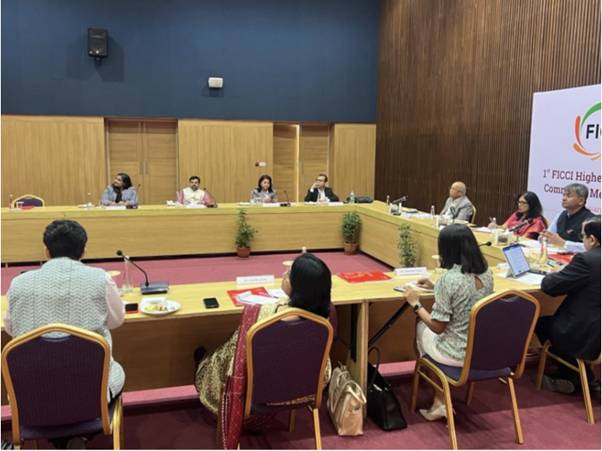
In 2024, Amrita Vishwa Vidyapeetham supported regional-level policy development for clean energy and energy-efficient technologies through its Live-in-Labs® programme, which enables structured engagement across multiple regions and states in India. By embedding interdisciplinary research teams within communities, Live-in-Labs® generated region-specific evidence on energy access gaps, renewable energy feasibility, and scalable efficiency solutions such as decentralised solar systems and energy-efficient cooking technologies.
Findings from these engagements were consolidated and shared with state-level and regional stakeholders, supporting adaptive planning and evidence-based policy formulation tailored to diverse socio-economic and geographic contexts.
Key regional-level organisations and institutions engaged:
These engagements strengthened regional policy coherence by ensuring that clean-energy and energy-efficiency strategies were informed by on-ground realities and community-tested solutions.
At the local level, Amrita Vishwa Vidyapeetham directly supported village- and panchayat-level policy developmentthrough Live-in-Labs® community immersions conducted in 2024. The programme worked closely with local governance institutions and community groups to identify energy challenges, co-design solutions, and translate community needs into actionable policy inputs.
Participatory consultations focused on household energy use, renewable energy adoption, energy-efficient practices, and sustainable livelihoods. Community-specific recommendations were formally documented and shared with local authorities to inform village-level planning and implementation.
Key local organisations and institutions engaged:
Gram Panchayats (including Alappad Panchayat, Kerala)
Self-Help Groups (SHGs)
This bottom-up approach strengthened local governance capacity and ensured that clean-energy and energy-efficiency policies were inclusive, locally relevant, and implementation-ready, reinforcing community ownership of sustainability transitions. Lorem ipsum dolor sit amet, consectetur adipiscing elit. Ut elit tellus, luctus nec ullamcorper mattis, pulvinar dapibus leo.
